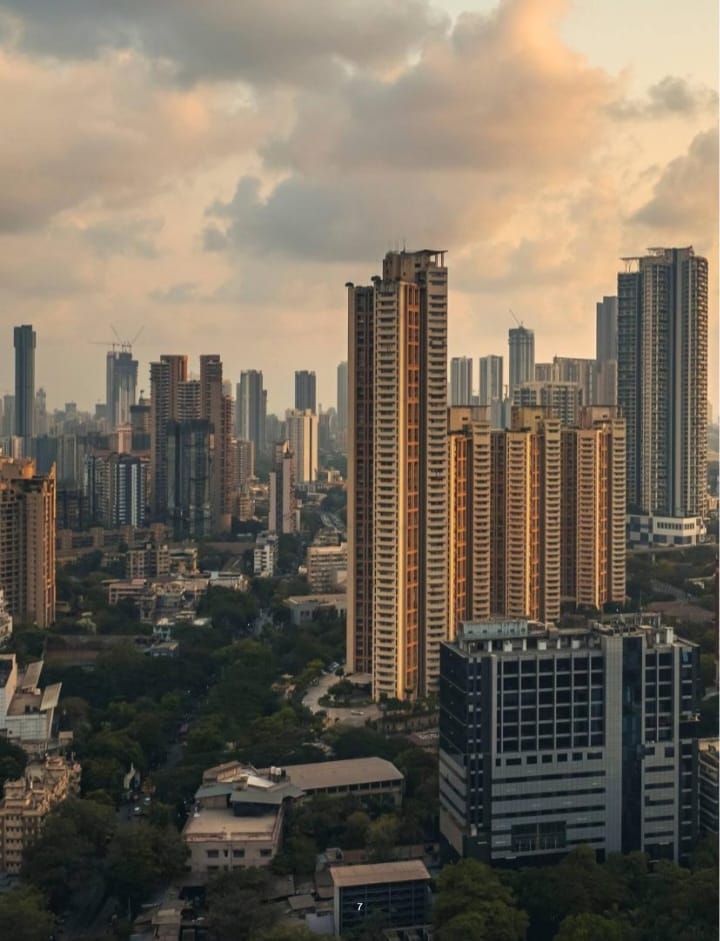BB Desk
Mumbai’s housing landscape is currently experiencing a major transformation, as ongoing society redevelopment projects are expected to add over 44,277 new homes valued at ₹1,305 billion by 2030, reveals a recent report by Knight Frank India.

Since 2020, around 910 housing societies across the Municipal Corporation of Greater Mumbai (MCGM) limits have signed development agreements, unlocking nearly 327 acres of land for redevelopment states the study. Despite this surge, the city has only begun to tap into its vast potential, with an estimated 1.6 lakh societies over 30 years old still eligible for redevelopment.
The Western Suburbs, stretching from Bandra to Borivali, account for the lion’s share of redevelopment activity with 32,354 units (73% of the total pipeline). This is followed by the Central Suburbs with 10,422 units, Central Mumbai with 1,085 units, and South Mumbai with 416 units.
Hotspots such as Borivali, Andheri, and Bandra together contribute nearly 139 acres of redevelopment activity, underscoring their position as the city’s leading transformation corridors. Between 2020 and H1 2025, the Western Suburbs alone accounted for 633 out of 910 society deals, recording 70% of all agreements signed since 2020. Central Suburbs may add another 234 societies, pushing the suburban contribution to almost 96%.
Beyond housing supply, redevelopment also carries major fiscal benefits. The free sale component from society redevelopment is expected to generate approximately Rs 7,830 crore in stamp duty and another Rs 6,525 crore as GST over the next five years.
Data indicates that over 80% of redevelopment deals signed since 2020 involved societies with plot sizes below 0.49 acres—highlighting the dominance of small, compact projects. Yet, larger cluster projects are gradually gaining momentum, hinting at a shift in the city’s redevelopment model.
Commenting on the report, Chairman & Managing Director, Knight Frank India, Shishir Baijal said,“Society redevelopment in Mumbai is both inevitable and essential, given the city’s limited avenues of greenfield growth and the constant rise in demand. Redevelopment has significantly reshaped the dynamics of several micro-markets and remains a critical driver of Mumbai’s urban renewal.”
Welcoming the findings, Industry leaders have underlined the economic and social importance of redevelopment. NAREDCO Maharashtra President, Prashant Sharma shares, “Redevelopment is the most vital force driving Mumbai’s real estate growth today. With limited greenfield land availability, society redevelopment not only provides safer, modern homes for existing residents but also fuels the city’s housing supply pipeline. It is imperative that all stakeholders – government, developers, and housing societies – work in sync to ensure timely execution and affordability.”
Navin Makhija, Managing Director of the Wadhwa Group adds, “It’s a win-win for all stakeholders – residents get homes with upgraded lifestyle amenities, developers gain access to scarce land parcels, and the state benefits through increased revenues while contributing to the central government’s ‘Housing for All’ initiative. Customers also benefit by gaining access to multiple project options in their preferred locations.”
Dhruman Shah, Promoter, Ariha Group further remarks, “Society redevelopment is no longer just an alternative – it is the primary growth driver for Mumbai’s housing market. The numbers shared reaffirm the enormous potential of this segment. For developers, the opportunity lies in bringing efficiency, transparency, and trust into the process, ensuring that societies feel confident in handing over their most valuable asset. With strong demand, government revenues, and improved infrastructure, redevelopment will continue to be the backbone of Mumbai’s real estate growth story.”
With nearly 160,000 societies that are over 30 years old and eligible for redevelopment, the sector’s potential is immense. While Knight Frank projects an optimistic outlook, developers caution that timely execution, transparent practices, and policy support will determine whether this transformation can be delivered at scale.
